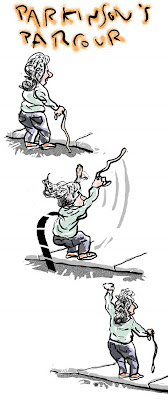
Who was the Ogre Who Says "No."? Well, for quite a while, he posed as me. This ogre alter ego crept into my character with patient stealth. The Ogre Who Says "No" set up shop in my head masquerading as the voice of reason. When someone had to play the heavy, the adult voice of delayed gratification, the Ogre was resigned but resolute, and stepped in.
He could be counted on to point out why we should stay home instead of going out, why we didn't need pets, or why we weren't saving enough. The Ogre phrasebook was full of lines like "Sure, but..." and "Do we really..." The Ogre was fluent in several languages because he only had to master one word. Nein, nyet, non, no.
The ogre was no dummy, and often had a point. The truth is that there are always good reasons to say no to just about anything. And that definitely includes saying "no" to the Ogre, who was a pain in the ass to live with. The Ogre had no joie de vivre, and without joie, vivre is thin gruel.
Can I blame Parkinson's for the coming of the Ogre? Probably not entirely. But the Ogre was not me. My Dad even noticed and was disturbed enough to contact my sibs asking if they had noticed that I had lost my "Ebullience." And given that the Ogre keeled over and died around the same time I got up to snuff on my Parkinson's medications, it's hard not to associate the two.
We buried the Ogre in a simple pine box. We never leave flowers. He wouldn't approve. But we do visit his grave now and again to honor him, and to reflect on his last words, carved on the cold granite of his headstone: "Carpe Diem".







